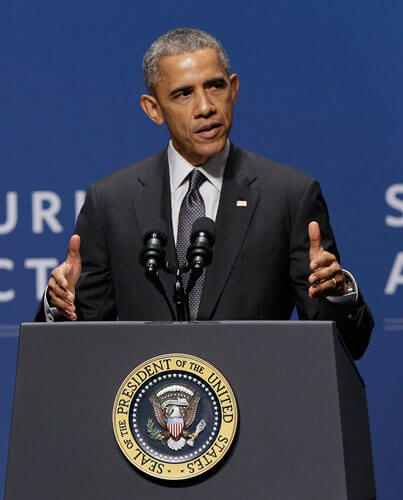“Remember, remember always, that all of us, and you and I especially, are descended from immigrants and revolutionists.”
―President Franklin D. Roosevelt
“Our journey is not complete until we find a better way to welcome the striving, hopeful immigrants who still see America as a land of opportunity, until bright young students and engineers are enlisted in our workforce rather than expelled from our country.”
―President Barack Obama
The Reforming American Immigration for a Strong Economy Act (RAISE Act), introduced by Republican Senators Tom Cotton (R-AR) and David Perdue (R-GA) at a White House press conference with President Trump recently, is the latest assault on immigrants and our heritage. These misplaced priorities fly in the face that we have always been, and will continue to be, a nation of immigrants!
All across America, immigrant communities are self-sufficient, thriving and progressive, and contribute massively to the national economy while hardly seeking any benefits.
The Trump administration revealed legislation last week that seeks to drastically change American immigration, moving away from the family based immigration tradition that has been the hallmark of our immigration policies for centuries and promoted family reunification, in favor of one that reduces people to numbers and rankings through a narrow and rigid point system.
This bill will be a disaster, if enacted. It would not create jobs, increase wages, or otherwise boost the economy. The RAISE Act does not increase the total number of employment-based immigration visas, and it cuts family based immigration visas by 85 percent by allowing only for a limited number of spouses and minor children to apply. This would be devastating to both our families and the economy, the very antithesis of America.
Bloomberg News editorial sounded this dire warning. “The sharp reduction in immigrant workers in the years ahead would also reduce tax receipts for Social Security, Medicare and Medicaid, the tripod supporting the nation’s rapidly aging baby boomers — 10,000 of whom retire daily,” the editorial said. Immigrants paid about $328 billion in taxes in 2014 alone, it quotes an estimate. “In effect, the plan would take the demographic headwinds the U.S. faces already and transform them into a gale.”
Statistics establish that immigrants account for vital domestic economic growth, play a key role in business development and community improvement, and are among the most upwardly mobile segments of the labor force. Economists agree that one of the keys to economic expansion is increasing the workforce-not shrinking it, as this bill would do.
Moreover, the pillars of the American family rests on reunification and family support, which inject positive economic benefits, and facilitate immigrant integration. Ethnic communities and families contribute critical resources for newcomers, including opportunities for employment, access to credit, and multiple kinds of support. The bill also seeks to eliminate the Diversity Visa, an abrogation of the principle that America welcomes individuals from diverse backgrounds. It will also eradicate the President’s authority to set refugee admissions and limit them to 50,000 per year.
Consequently, this proposal would lead to an overall reduction of legal immigration by 50 percent over the next decade. Taken together, the creation of a point system, the elimination of diversity and many refugee visas will result in the systematic exclusion of nationals from many regions of Africa, Central America, and Asia, all of whom have contributed indelibly to America’s progress as a nation.
It will devastate our nation, exacerbate, not cure, labor shortages, undercut our economy, and destroy our values.
Note: Albert Baldeo is a civil rights activist and community advocate. His political battles placed previously ignored minority communities like Richmond Hill and Ozone Park firmly on the political and economic map. As president of the Baldeo Foundation and Queens Justice Center, he has continued to fight for equal rights, dignity and inclusion in the decision making process. He can be contacted at the Baldeo Foundation: (718) 529-2300.

























